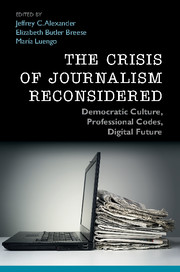Book contents
- Frontmatter
- Dedication
- Contents
- About the Contributors
- Preface
- Acknowledgments
- Introduction: Journalism, democratic culture, and creative reconstruction
- PART I THE CRISIS NARRATIVE
- PART II FEARS OF DIGITAL NEWS MEDIA: THE SYMBOLIC STRUGGLE
- 6 When codes collide: Journalists push back against digital desecration
- 7 Telling the crisis story of journalism: Narratives of normative reassurance in Page One
- 8 Assembling publics, assembling routines, assembling values: Journalistic self-conception and the crisis in journalism
- 9 The constancy of immediacy: From printing press to digital age
- 10 News on new platforms: Norwegian journalists face the digital age
- PART III PROFESSIONAL JOURNALISM, CIVIL CODES, AND DIGITAL CULTURE
- Conclusion: News innovations and enduring commitments
- Index
- References
10 - News on new platforms: Norwegian journalists face the digital age
from PART II - FEARS OF DIGITAL NEWS MEDIA: THE SYMBOLIC STRUGGLE
Published online by Cambridge University Press: 05 June 2016
- Frontmatter
- Dedication
- Contents
- About the Contributors
- Preface
- Acknowledgments
- Introduction: Journalism, democratic culture, and creative reconstruction
- PART I THE CRISIS NARRATIVE
- PART II FEARS OF DIGITAL NEWS MEDIA: THE SYMBOLIC STRUGGLE
- 6 When codes collide: Journalists push back against digital desecration
- 7 Telling the crisis story of journalism: Narratives of normative reassurance in Page One
- 8 Assembling publics, assembling routines, assembling values: Journalistic self-conception and the crisis in journalism
- 9 The constancy of immediacy: From printing press to digital age
- 10 News on new platforms: Norwegian journalists face the digital age
- PART III PROFESSIONAL JOURNALISM, CIVIL CODES, AND DIGITAL CULTURE
- Conclusion: News innovations and enduring commitments
- Index
- References
Summary
Over the past decade, social and political change, economic instability, and the emergence of new technologies have changed the commercial news media and media systems in many countries in ways nobody could have envisioned at the time (Nielsen, Esser and Levy 2013; Picard 2010).The Western world's “journalism-in-crisis” narrative features strongly in both public and academic debates. It is, however, reasonable to believe that changes and transformations in news journalism will take different paths according to the specific cultural and institutional setting (Nielsen, Esser and Levy 2013, 385). For example, comparative studies of media transformation have shown that Germany is uncharacteristic in the sense that publishing continues to be a profitable business (Brüggeman, Esser and Humprecht 2012, 742).
In this chapter we examine transformations within the Norwegian news media in relation to processes of digitalization. As with Germany, Norway could also be considered a special case, where the sense of crisis is arguably less profound than in other countries. Norway is characterized by still relatively high print readership, financial affluence, and strong cultural policies related to the media (Syvertsen et al. 2015). However, as Brüggeman, Esser and Humprecht (2012) showed for the German case, crisis narratives are not strictly dependent on financial conditions. Rather, they can exist despite a country's financial health, and be used as strategic tools by media actors to consolidate and expand their position. Taking as our point of departure the idea that situations are coded by the social meanings different actors bestow upon them, we seek to identify the cultural dynamics underlying present debates within the media industry. In Alexander's (2009) terms, the mobilization of different narratives, both by journalists and media proprietors, can be seen as part of a power struggle, with a view to maintaining or regaining a given position in a changing environment. Power struggles in democratic societies, Alexander suggests, are ultimately symbolic struggles, where the aim of a certain group or profession is to be able to embody the ideals of the civil sphere (2009, p.68).
Based on a representative survey, we examine the opinion of Norwegian journalists working on various platforms on the consequences of digitalization for their work as professionals. We ask to what degree journalists see their profession as in a state of crisis as a result of digitalization processes and how they view the effect of digitalization on the quality of their work.
- Type
- Chapter
- Information
- The Crisis of Journalism ReconsideredDemocratic Culture, Professional Codes, Digital Future, pp. 190 - 208Publisher: Cambridge University PressPrint publication year: 2016
References
- 3
- Cited by



